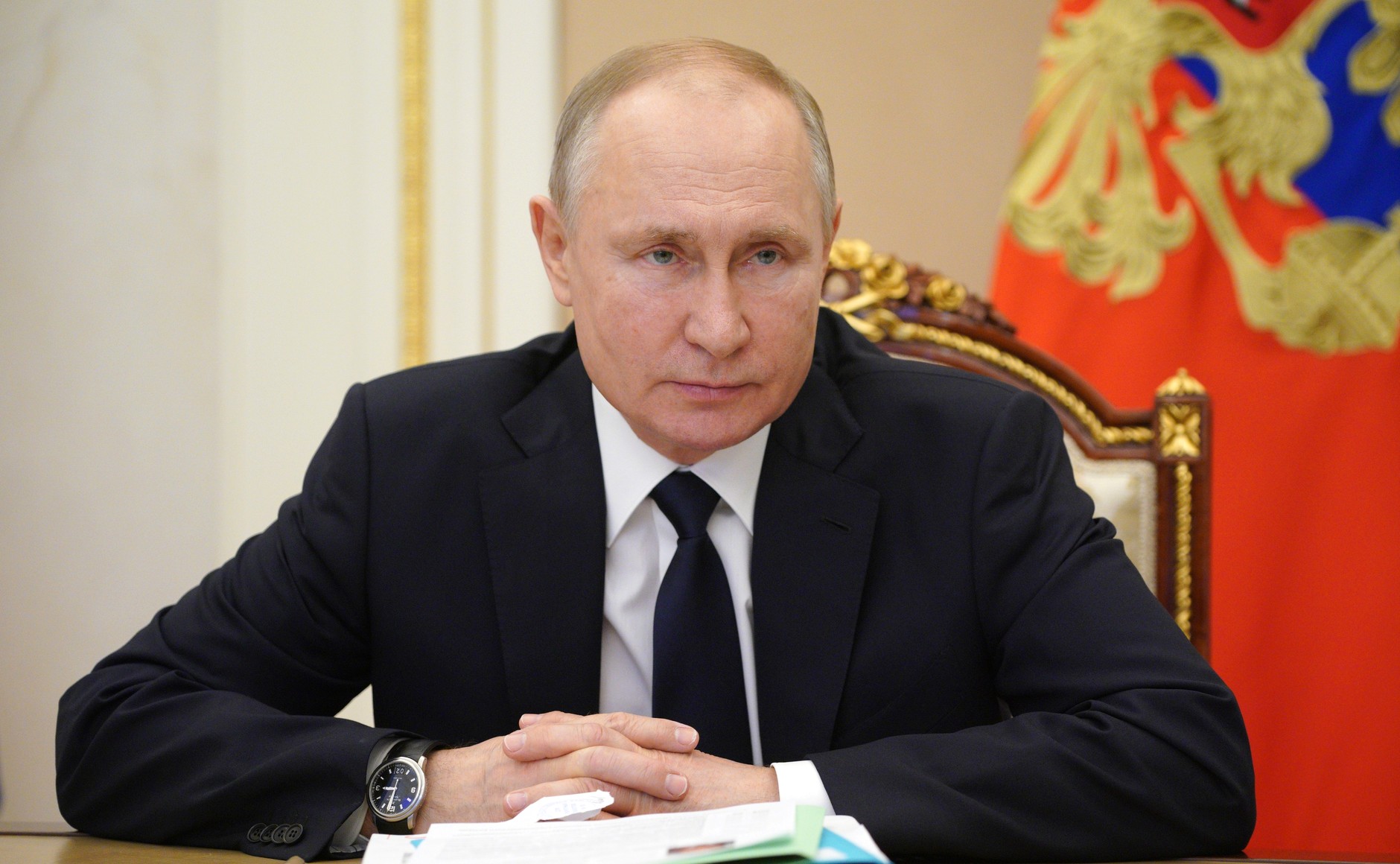Putin’s Memory Laws Set the Stage for His War in Ukraine
Vladimir Putin’s rewriting of the history of World War II set the stage for his war in Ukraine.

Published by The Lawfare Institute
in Cooperation With

Two days before the Russian invasion of Ukraine, the Russian State Duma introduced a bill attaching fines and prison sentences to a 2021 law banning “any public attempt to equate the aims and actions of the Soviet Union and Nazi Germany during World War II, as well as to deny the decisive role of the Soviet people in the victory over fascism.” What does this bill have to do with the invasion of Ukraine? In short, everything. Russian President Vladimir Putin’s rewriting of the history of World War II has set the stage for his war in Ukraine.
Over the past week, Putin has cynically used the language of “denazification” in a barrage of propaganda to rally Russians behind a war against Ukraine. He has misrepresented the unjust invasion of Ukraine as a humanitarian intervention. And he has falsely accused “the Kyiv regime” of committing “crimes against peaceful people” and carrying out the “genocide” of Russians—using the language of Soviet and international war crimes trials after World War II.
In claiming to rescue Russian “victims” in Ukraine, Putin is building on a foreign policy strategy from the 1990s. The Russian political scientist Sergey Karaganov, who served as an adviser to Boris Yeltsin and to Putin, has long argued that Russia should present itself “as the defender of human rights of ethnic Russians living in the ‘near abroad’” in order to expand its political influence into those regions. This has played well domestically with those Russians who experienced the dissolution of the Soviet Union as a tragedy.
But Putin has taken this strategy to a new level by falsely depicting Ukraine’s leaders, including its Jewish president, Volodymyr Zelensky, as “Nazis”—and by accusing the West of “turning a blind eye” to the murder of women and children.
Putin is tapping into the deep emotions surrounding the memory of World War II. The Soviet Union lost 27 million people in the war. Victory Day, celebrated every year on May 9, remains the most important Russian national holiday. Many Russians believe that the rest of the world has never fully appreciated their sacrifice. For the past year, the Russian state media has fed this grievance while publicizing thousands of declassified documents about Nazi war crimes during World War II and simultaneously hammering home a false narrative about a neo-Nazi takeover of present-day Ukraine.
In some circles, this effort to link the struggle against Nazi Germany to Russia’s invasion of Ukraine has been succeeding. An old friend in Moscow told me with disgust that I couldn’t possibly understand the Russian actions in Ukraine because my grandfathers had not marched to Berlin and my uncles had not died defending Leningrad.
Putin has already cemented the memory of the Second World War as a cornerstone of Russian state ideology. The addition of fines and prison sentences to Russia’s memory law is the culmination of a decade-long effort to impose total control over how the war is talked about and remembered. One of the bill’s co-authors, Alexei Pushkov, has described the memory law as “a moral imperative.” One of its stated aims is to prevent people from “insulting the memory of the defenders of the Fatherland.” Russia is not alone here. Poland has adopted a similar law criminalizing “public speech claiming that the Polish state was responsible or co-responsible for Nazi crimes committed by the Third Reich.”
But Russia’s memory law has its own nuances. Pushkov and others have argued that the “legal basis” of this law can be found in “the verdict of the Nuremberg Tribunal.” Why are they looking to the Nuremberg trials?
Putin and Pushkov like the Nuremberg verdict for a simple reason: It blames Nazi Germany alone for certain Soviet-German crimes against peace. The Soviet Union, as a victor and as one of the four countries of the prosecution, was not held accountable at Nuremberg for the secret protocols to the Soviet-German Non-Aggression Pact of August 1939, in which Hitler and Stalin plotted the conquest and division of Poland and the Baltic states. It was not held responsible for its invasion of Poland on Sept. 17, 1939, two weeks after Germany invaded from the west, or for its invasion and annexation of Latvia, Lithuania and Estonia less than a year later. Nor was it held responsible for the war crimes that followed, including the Katyn Forest Massacre of Polish military officers. Archival documents released in 1992 clearly demonstrate that the Soviets carried out the atrocity.
Last September, the Russian Foreign Ministry doubled down on its characterization of the Soviet invasion of Poland in 1939 as “a campaign of liberation” that was undertaken to protect Belorussians and Ukrainians after the invasion by Germany. And the ministry accused scholars who discussed Soviet-German collaboration of smearing the memory of the war. The threat of jail or fines will further suppress the truth about the Soviet invasion of Poland—and about the arrests, deportations, show trials and executions that ensued.
Why does this matter now? Russia’s invasion of Ukraine has important parallels with the Soviet invasion of Poland and the Baltic states. Scholars and journalists have been quick to compare Putin’s moves with Hitler’s, but a comparison with Stalin’s actions in 1939 and 1940 might be more revealing.
Putin in 2022, like Stalin in 1939, is attempting to reconfigure the geopolitical balance of power. Putin, like Stalin, is attempting to enlarge his state and expand its influence with revanchist claims to territories that had once been part of a larger empire. Putin, like Stalin, has launched a war of aggression while calling it a special operation aimed at aiding civilians and “restoring the peace.”
Putin’s war on Ukraine is being supported by an information war—about the present and about the past. It might seem somewhat irrelevant to debate history during an extreme crisis, while the Russian military is bombing Ukrainian cities. But narratives matter. Putin understands this, and we should too. His rewriting of the history of World War II will continue to play a crucial role as he attempts to explain his invasion of Ukraine to the Russian population.





